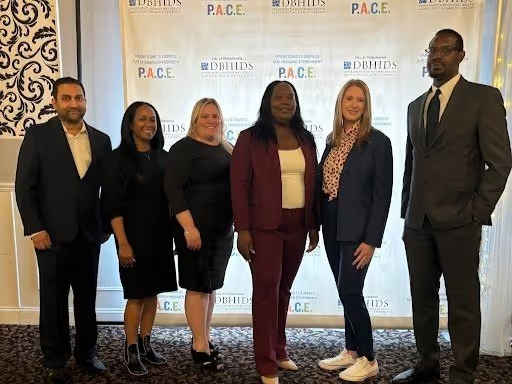January 15, 2024
Youth Mental Health Crisis: What No One Is Telling You
Uncover eye-opening insights into the youth mental health crisis, combining compelling data with personal stories to reveal systemic challenges and actionable strategies for driving meaningful change.

Youth Mental Health Crisis: What No One Is Telling You
Contributor: Fionn Hyland, Mental Health Partnerships Advocacy Intern
… It’s Our Responsibility
By Fionn Hyland, Mental Health Partnerships Advocacy Intern
Young people are our future. And it is our responsibility to ensure they have the right tools and resources to keep that future bright.
According to the American Academy of Child and Adolescent Psychiatrists, 66,000 children in Philadelphia are potentially at risk for mental health disorders, yet there are only 60 qualified psychiatrists available to treat them.
In Pennsylvania, we rank 13th in the nation for a lower prevalence of mental illness and higher rates of access to care according to Mental Health America. However, these numbers hide significant challenges:
- 20% of youth (ages 12–17) experienced at least one major depressive episode in the past year — that’s 193,000 individuals.
- 53.7% of those youth received no mental health services at all.
- Of those who did receive help, 64.5% said the counseling or treatment helped.
- 13.46% of youth reported having serious thoughts of suicide — impacting 127,000 young people.
- 8.55% of youth experienced a substance use disorder in the last year — approximately 80,000 youth.
- 8.2% (or 40,000 youth) with private insurance had plans that didn’t cover mental or emotional health.
Even with a relatively good ranking, these stats show Pennsylvania’s youth are struggling. We must continue advocating for better mental health access so all young people receive the care they need.

Fulfilling that responsibility begins by educating ourselves, staying updated on policy, and supporting elected officials who take action to address the mental health of our youth.
My Must-Have Mental Health Policy Resources
- Tool 1:
Set up Google Alerts for mental health topics that matter to you. Stay informed on national and local trends. - Tool 2:
Use University or Community Libraries. Librarians are fantastic resources for research support. - Tool 3:
Explore organizations like Mental Health America and the National Council for Mental Wellbeing for up-to-date data and trends. - Tool 4:
Refer to federal/state agencies like SAMHSA for research-backed mental health resources. - Tool 5:
Be cautious with social media (e.g., Facebook, Instagram, TikTok, YouTube). Always verify the information through credible sources.
Secret Tool: Follow your elected officials’ press releases and legislation updates for immediate action being taken on mental health issues.
Legislation in Action
- Pennsylvania – HB 2311: Proposed by State Rep. Mike Schlossberg, this bill supports mental health screening in grades 6–12. Schools can hire qualified staff or partner with external vendors. Screenings are optional and aim to catch mental health struggles early.
Read the bill - New Jersey – A2328: Assemblyman Raj Mukherji’s bill allows teens 13+ to access mental health services without parental consent—especially critical in cases of sexual health or assault. The aim is to increase access and reduce mental health crises.
Read the bill - New York – A8148: Governor Hochul’s legislation restricts addictive features on social media that harm youth. The intent is to limit time online and reduce associated negative mental health effects.
Read more
Our responsibility is to ensure teens and adolescents have the tools and support they need to cope with daily stressors. The best way to do that is by:
- Educating ourselves
- Finding reliable, fact-checked information
- Supporting policies and elected officials that advocate for youth mental health
Stay educated, verify information, and support effective legislation to combat the youth mental health crisis.
About Fionn: Fionn is a first-generation American studying psychology at Temple University. They are passionate about mental health equity and are especially focused on empowering schools to better support students' emotional well-being.
Related Reading from Our Advocacy Corner
Stay informed and inspired by exploring more stories from our Advocacy Corner. From uplifting community visits to powerful policy insights and personal recovery journeys, these articles spotlight the people and progress shaping mental health advocacy today.
Transforming Lives, Strengthening Communities
From peer-led recovery programs to statewide advocacy and education, our work touches thousands of lives every year. These numbers reflect our deep commitment to accessible, compassionate, and person-centered mental health support across Philadelphia and Southeastern Pennsylvania.


8,480
individuals and families served
34
active programs across the region
1,106
Peer Specialists trained each year
5,801
people supported through direct services
3000+
individuals reached monthly through homeless outreach
1,573
engaged in community advocacy
Real Stories of Hope and Recovery
We’re here to champion every journey to wellness, offering unwavering support and transformational advocacy. Together, we foster resilience and recovery—so everyone can thrive and live their fullest life in the community, free from barriers to mental health care.
"I'm so grateful for the community that's here and the people that I get to work with in a way that they inspire me every day."
"Every experience I've had with MHP thus far has been great, from the training to being able to get support, a community, sponsorships to go places I never thought I'd go."
"MHP has given me so much, I want to give back."
"Give you your own purpose, you know, just like doing something more. Just a good feeling for me. Now I can be productive."
"MHP has a long history of being a really trusted and reliable resource for peer specialists.
So these experiences already live within your walls."
"The incredible empowerment and the impact that peers have in the field of mental health."
"There's something really, really powerful that happens when you're connecting with someone who's sitting across from you and says, you know, I see you and I hear you. Because I've been there."
"...and just that little click. Wow, it's so powerful just to have somebody who understands exactly how you feel, because we can sympathize all day, but to have somebody else in the room with me, to say, I've done it too, I've experienced that too, allows for a bond that goes beyond words."
"That opened me up to talk to other people so I could coach them and have them get the aha moment again. I did it and I'm glad that I got into new ways of thinking."
"I'm able to be helpful just to know that, like, all that hard work I put through actually paid off."
"And I hope that everybody would get the opportunity to connect with that organization"
"At Mental Health Partnerships. Together..."
"Together..."
"Together..."
"Together...we build hope."
"Together...we build hope."
"We build hope."
"We build hope."
"Together...we build hope."
"Together...we build hope."
"Together...we build hope."
"Period!"
Guiding Principles for Empowerment and Growth
At the heart of our mission lies a steadfast commitment to core values that shape every aspect of our work. These values—rooted in hope, empowerment, and respect—guide us in fostering environments where individuals can thrive, exercise self-determination, and pursue lifelong learning. By embracing a holistic, non-judgmental, and culturally aware approach, we empower individuals to achieve their full potential and contribute to their communities.

Together, We Build Hope
At Mental Health Partnerships, we are dedicated to fostering hope and resilience. Our mission is to create a supportive environment where individuals can regain control of their mental health and live fulfilling lives. We offer personalized care that aligns with your unique needs and helps you connect with a community that cares.




Real Stories of Hope & Gratitude
Hear directly from individuals whose lives have been touched by our programs and services. Whether it’s case management, family support, or peer-led guidance, these stories showcase the power of compassionate care and unwavering belief in every person’s potential for recovery and growth.

Let’s Take the Next Step Together
At MHP, we understand that the journey to mental wellness can feel overwhelming. With peer-led support, proven resources, and a warm, caring community, we’re here to guide you through every step—so you never have to walk this path alone.




































